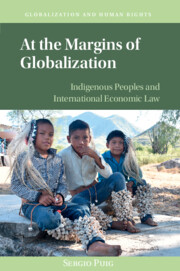Book contents
- At the Margins of Globalization
- Globalization and Human Rights
- At the Margins of Globalization
- Copyright page
- Dedication
- Contents
- Tables
- Preface and Acknowledgments
- Introduction
- 1 Globalization and Its Multiple Discontents
- 2 The Process of Susceptibility and Exclusion
- 3 Indigenous Peoples under International Economic Law
- 4 The Experience of Indigenous Peoples under Economic Regimes
- 5 The Recalibration of Indigenous Rights and Economic Law
- 6 Indigenous Interests and the Future of Economic Treaties
- 7 Toward an Indigenous-Based Critique of Globalization
- Conclusion
- Index
- Series page
Introduction
Published online by Cambridge University Press: 23 April 2021
- At the Margins of Globalization
- Globalization and Human Rights
- At the Margins of Globalization
- Copyright page
- Dedication
- Contents
- Tables
- Preface and Acknowledgments
- Introduction
- 1 Globalization and Its Multiple Discontents
- 2 The Process of Susceptibility and Exclusion
- 3 Indigenous Peoples under International Economic Law
- 4 The Experience of Indigenous Peoples under Economic Regimes
- 5 The Recalibration of Indigenous Rights and Economic Law
- 6 Indigenous Interests and the Future of Economic Treaties
- 7 Toward an Indigenous-Based Critique of Globalization
- Conclusion
- Index
- Series page
Summary
This book offers pathways to extricate indigenous peoples from the impacts of economic globalization. It examines the complex interactions between human and economic-focused areas of international law – international economic law and human rights law mainly with one particular frame, that of the groups subjugated and marginalized by the process of globalization. I assert that, the ones truly left behind by the current form of economic interconnection are inter alia indigenous peoples. Their voices have been only slightly and recently taken into account in this current wave of contestation, and their perspective may provide a path for organizing transformational action. International economic law should enable the dissemination of core values of international law – human rights law in particular. In spite of their overlapping principles, a blind spot of international economic law is the limited engagement with the different notions of responsibility toward the planet that indigenous peoples often demonstrate. The author shares his years of practice and teaching experiences, which will be of use to international economic law lawyers and indigenous rights advocates.
- Type
- Chapter
- Information
- At the Margins of GlobalizationIndigenous Peoples and International Economic Law, pp. 1 - 8Publisher: Cambridge University PressPrint publication year: 2021

